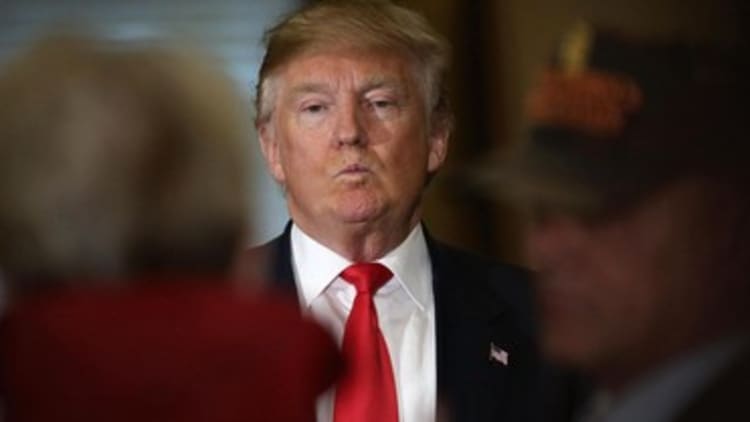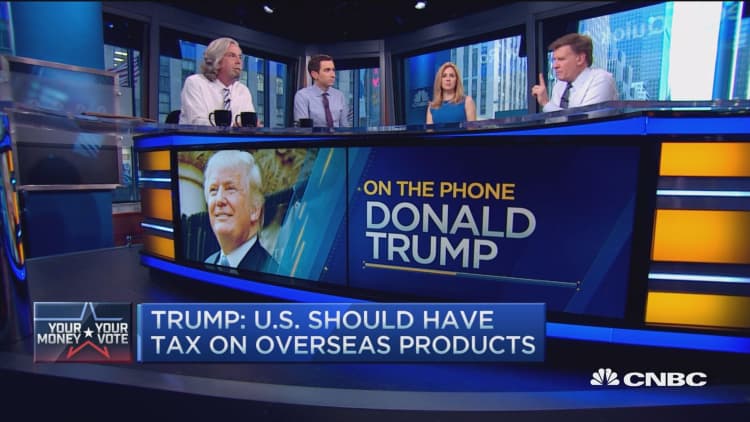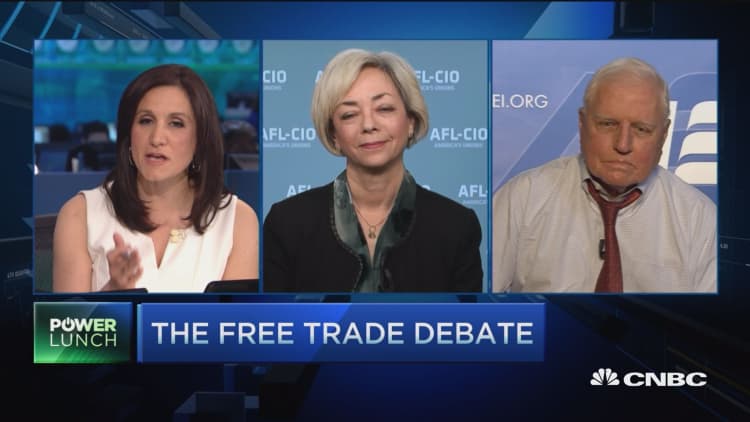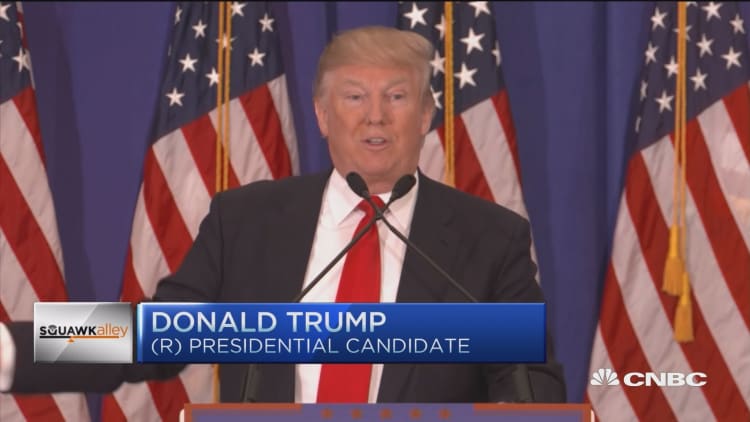


When Mitt Romney unleashed a barrage of criticism against his party's front-runner, he began with the economic argument against Donald Trump. He's not alone in these claims: Many economists are also expressing their concern that the real estate magnate's policies could lead to a global recession.
Romney charged that Trump "would be very bad for American workers and for American families." But Trump's tax plan bears many similarities with other GOP hopefuls in that it would reduce the marginal rates for many individuals and businesses. Instead, it's his propositions for America's place in the global economy that are raising eyebrows.
"We have so much power and we don't use it," Trump told CNBC's "Squawk Box" in an interview Thursday. "We can't let the world take advantage of us from an economic standpoint, and that's what they're doing."
Trump argued that other countries are unfairly taking advantage of the U.S. through a combination of high taxes on American products and devaluing their own currencies. While using the American economy as "the money supply," these countries are bleeding high-paying jobs — and whole companies — out of the U.S., Trump contended.
The solution, Trump has said, is to levy high tariffs on the goods of any country he feels treats America unfairly.
"There's only one thing you can really do — I mean you can devalue, but you can do something else which I think is probably much better than devaluing — you can charge surtax or you can charge a tax for products that they sell in the United States," Trump said. "I have great relationships and business relationships with China, and even those people say they can't believe what they're getting away with."
But many experts interviewed by CNBC dismissed Trump's calls for extreme tariffs — 35 percent on Ford vehicles from Mexico and 45 percent on Chinese goods — saying they strained credulity, even by campaign-promise standards.
"I think in order to qualify as a coherent set of policies, the policies have to not be cartoonish and the policies have to stand some chance of being actually enacted, and I just don't think Mr. Trump's trade policies meet either of those criteria," said Michael Strain, resident scholar at the conservative American Enterprise Institute.
A spokeswoman for Trump's campaign did not immediately return a request for comment on this article.
Congress would never assent to such extreme measures, Strain said, because international trading partners and domestic businesses would immediately apply "enormous pressure." But beyond the political possibility of such a proposal, massive tariffs would also have significantly deleterious effects for the U.S. and world economy, several economists said.
Even if the welfare of the rest of the globe is excepted, such a tax on goods imported from China would "tremendously" hurt the poor by jacking up the prices on many of the products they most frequently use, said Caroline Freund, a senior fellow at the Peterson Institute for International Economics.
But extreme tariffs would also hurt American manufacturing — the very sector that Trump says he seeks to bolster — by raising the prices on production inputs sourced from abroad. Steel from China, for example, would become significantly more expensive for more U.S. firms, Freund said.
"So many U.S. companies are deeply involved in global supply chains: I can't even imagine what that would look like with high tariffs," she said.
Expanding the economic view to the global level, experts said Trump's strong measures would likely start an international trade war that cripples everyone involved. One argument economists make is that high tariffs on goods from a country like China will lead to an oversupply of products unable to be sold in the U.S., so those goods will go for even cheaper than normal in other countries, and those countries will then respond with tariffs of their own. The end result is high prices around the world, and a slowdown in international growth — or even an outright recession.
Some countries might raise taxes on American goods just as a reaction to a more isolationist economic policy, experts said.
"If you take (Trump's) position as real, that we would do this, then it would take the world down the road that we saw in the 1930s that we saw with the Smoot–Hawley Tariff," Freund said. "The world would definitely fall into a recession."
That 1930 act significantly raised tariffs on goods coming into the United States, and "economists still agree that Smoot-Hawley and the ensuing tariff wars were highly counterproductive and contributed to the depth and length of the global Depression," then-Federal Reserve Chairman Ben Bernanke said in 2013.
Although most economists present a united front on the benefits of free trade, many argue against completely unfettered global capitalism. The usual form of that criticism emanating from both sides of the debate is that free trade deals between the U.S. and poorer countries hurt the American middle class while contributing to worker exploitation abroad.
Trump insisted on CNBC that he believes in free trade, but "to be a good free trader you have to have smart people on our side also, and we are being out negotiated on every corner." And Trump isn't the only candidate this year who has expressed doubt about America's global trade position.
"These treaties have forced American workers to compete against desperate and low-wage labor around the world. The result has been massive job losses in the United States and the shutting down of tens of thousands of factories," a statement on Democratic hopeful Bernie Sanders' Senate webpage said. "These corporately backed trade agreements have significantly contributed to the race to the bottom, the collapse of the American middle class and increased wealth and income inequality."
But many of those who say Trump has rightly diagnosed a problem are wary of his prescriptions.
Thea Lee, deputy chief of staff at the AFL-CIO, told CNBC's "Power Lunch" last week that "there's no question" recent trade policies have failed American workers, but she said she worries Trump doesn't have "very many solutions about where we need to go."

"His proposals aren't viable, they're not practical, and they're hypocritical — to be honest," she said, referring to his call for Nabisco to bring Oreo production back from Mexico, while many of his own clothing lines are produced offshore. "There's no question that we have a terrible disadvantage right now because our trade policies have failed, but obviously he's talking about policies that would be outside of all our current trade agreements and trade rules."
For Peter Schiff, CEO of Euro Pacific Capital, Trump has rightly identified the problematic imbalance of trade between the U.S. and countries like China — but the real estate magnate's tariff proposals are just treating symptoms, not the real problem of big government, over-regulation and the lack of savings spurred by Fed policy.
Schiff said he agreed with others that Trump's tariffs would hurt many Americans in the short term, spiking prices, squeezing companies, increasing layoffs and deepening recession. But just as critically, that near-term pain would not be sufficient to renew America's manufacturing base.
"Protectionism works when you have an industry to protect, but when industry is gone, it's just higher prices," Schiff said, explaining that there are few U.S. firms ready to supply Americans with the goods they've come to expect from Chinese sources.
Even CNBC contributor Larry Kudlow, who has endorsed Trump's tax plan, warned last year that the candidate's "protectionist" trade proposals could backfire.
But some have cheered Trump's proposals. In a note Thursday, Peter Morici, an economist and business professor at the University of Maryland, said the candidate's tariff suggestion "makes sense."
"Trump's proposed tariff on imports to force China to revalue its currency and renegotiate its trade practices is hardly reckless," he said, citing a similar prescription from liberal quarters.
It is absolutely possible that Trump's trade positions are not actually a set of goals, but are instead initial bids in a protracted negotiation against those he considers to be abusing the international system. In fact, Trump's own website says his plan to reform the U.S.-China trade relationship is at its heart "a negotiating strategy to bring fairness to our trade with China."
But even if the calls for extreme tariffs are tactics to achieve moderate protection, experts said they struggled to find sense in Trump's rhetoric.
"It's not just different in degrees, it's different in kind," American Enterprise Institute's Strain said. "He's talking about the opening salvo of a trade war, and the opening salvo of a trade war is just a different thing than the modest protection of an industry."
Peterson Institute's Freund agreed, saying that "it's not clear" why he would want to start a negotiation from a position so far outside the international norm.
Most advanced economies have tariff levels around the U.S.'s simple average of 2.67 percent, and most developing countries keep tariffs under 10 percent.






